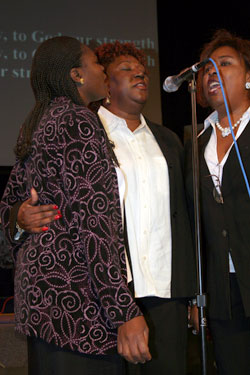 Mennonite World Conference has released the Mennonite, Brethren in Christ and Related Churches World Directory 2006. New numbers show membership in the 217 churches now listed in 75 countries around the world is just under 1.5 million (1,478,540). Africa, with 529,703 members, continues to have the largest and fastest growing membership among the five continental regions. The Meserete Kristos Church (MKC) in Ethiopia is the largest national conference globally, with 130,727 members. All continental regions except Europe have shown increased membership.
Mennonite World Conference has released the Mennonite, Brethren in Christ and Related Churches World Directory 2006. New numbers show membership in the 217 churches now listed in 75 countries around the world is just under 1.5 million (1,478,540). Africa, with 529,703 members, continues to have the largest and fastest growing membership among the five continental regions. The Meserete Kristos Church (MKC) in Ethiopia is the largest national conference globally, with 130,727 members. All continental regions except Europe have shown increased membership.
The 2003 World Directory listed 200 bodies in 65 countries with a total membership of 1,297,716.
According to 2006 numbers, Africa has stretched its membership lead over North America by some 30,000, a 17.2 percent increase since 2003. Africa surged ahead of North America for the first time in 2003 with 451,959 baptized members compared to 451,180 in North America.
Membership in North America in 2006 has grown to just under half a million (499,664), an apparent increase of 10.7 percent. However, the increase is partly due to changes in reporting since the new number includes more independent groups. Another factor in the larger number is the rapid growth among Old Order groups due to large families and a 90 percent retention rate among their youth.
Until 2005, Mennonite Church USA was the largest national conference. It now numbers 110,696 members, more than 20,000 fewer members than the MKC in Ethiopia.
Other national churches with 100,000 members or more include the Conference of Mennonite Brethren Churches in India (103,488) and the Comunauté Mennonite au Congo (100,000).
The six countries with the most baptized members are the same as in 2003, but India and Canada have switched places in the list. The six countries in order of rank are: USA (368,280); Congo (216,268); India (146,095); Canada (131,384); Ethiopia (130,731); and Indonesia (72,624).
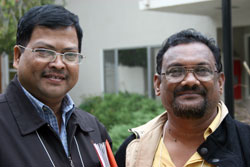 Second to Africa in the rate of growth among continental regions is the Caribbean, Central and South America (16.8 percent), with 155,531 members in 2006 compared to 133,150 in 2003. Close behind is Asia and the Pacific (15.9 percent) with 241,420 members in 2006, up from 208,155 in 2003. Numbers for North America, in fourth place in terms of growth, are noted above. Europe showed a slight decline of 1.9 percent with 52,222 members in 2006 compared to 53,272 in 2003.
Second to Africa in the rate of growth among continental regions is the Caribbean, Central and South America (16.8 percent), with 155,531 members in 2006 compared to 133,150 in 2003. Close behind is Asia and the Pacific (15.9 percent) with 241,420 members in 2006, up from 208,155 in 2003. Numbers for North America, in fourth place in terms of growth, are noted above. Europe showed a slight decline of 1.9 percent with 52,222 members in 2006 compared to 53,272 in 2003.
The shifts, up in Asia and down in Europe, are due in part to a change in recording the 500 members in the independent countries of Kazakhstan and Kyrgyzstan, now listed in Asia but formerly counted with Europe as part of the Commonwealth of Independent States.
Inclusion in the World Directory does not mean membership in Mennonite World Conference. Churches and conferences are included in the directory if they are rooted in the Anabaptist-Mennonite stream of church history or have direct fellowship with churches that are so rooted.
New listings in the 2006 directory, some of which are independent groups, include churches in Botswana, Republic of Congo (Brazzaville), The Gambia, Thailand, Bahamas, Romania, Ukraine and a new conference in Haiti.
National churches and conferences submit membership numbers to MWC. Methods of counting and reporting vary widely, but MWC attempts to treat reports as consistently as possible and to get reliable figures. Totals may indicate greater accuracy in reporting as well as changes in church membership.
Copies of the new directory will be mailed to all member conference offices for the presiding officers and to General Council delegates. Others may request copies from Kitchener, Ontario (Canada), Fresno, California (USA) or Strasbourg, France, MWC offices. MWC welcomes donations ($5 US is suggested) to cover the costs of producing and distributing the directory.
Ferne Burkhardt, Mennonite World Conference news editor
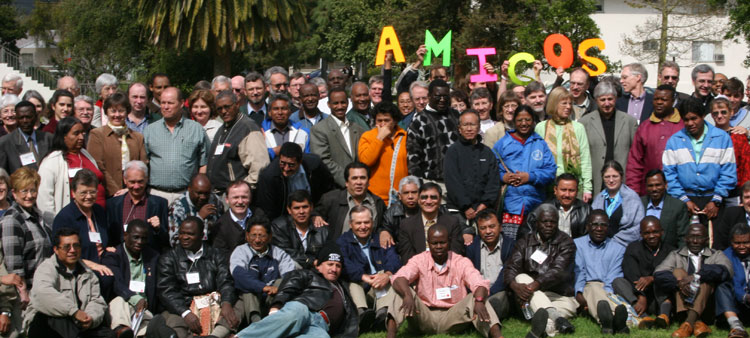
photos by Alex Miler


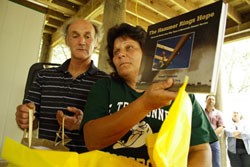 By Tim Shenk
By Tim Shenk I was the fifth passenger in Earl Anders’ car, crammed into the back seat with two older Mennonite women with coverings, glad that I was offered a ride instead of biking through the dreary day. Most of the drive’s conversation was in the back seat, observing how greatly the landscape has changed since they have last been taken this trip to the area where they grew up. They talked about the tragedy of increased housing prices and decreased number of farms, and how years ago the boys used to shake the bridge across the creek when the girls would walk across. They kept apologizing for the conversation.
I was the fifth passenger in Earl Anders’ car, crammed into the back seat with two older Mennonite women with coverings, glad that I was offered a ride instead of biking through the dreary day. Most of the drive’s conversation was in the back seat, observing how greatly the landscape has changed since they have last been taken this trip to the area where they grew up. They talked about the tragedy of increased housing prices and decreased number of farms, and how years ago the boys used to shake the bridge across the creek when the girls would walk across. They kept apologizing for the conversation.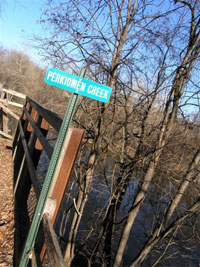 I was on. I shared about Bikemovement and our purpose, struggles and dreams. I shared mostly with photos and personal stories. We talked about how many churches are struggling to connect with their young adults, how many are leaving and not returning. They mentioned how the Baptist church next door is always full to the brim on Sunday. We acknowledged that we all have struggles and broken relationships and that the church can be a relevant community to gather and grow together. They shared with me how they used to bike around the area on single speeds to get to school or visit friends. Some said they used to go to church events for the social space, perhaps to meet the girls from the far edge of the conference—Blooming Glen, about 10 miles up the road.
I was on. I shared about Bikemovement and our purpose, struggles and dreams. I shared mostly with photos and personal stories. We talked about how many churches are struggling to connect with their young adults, how many are leaving and not returning. They mentioned how the Baptist church next door is always full to the brim on Sunday. We acknowledged that we all have struggles and broken relationships and that the church can be a relevant community to gather and grow together. They shared with me how they used to bike around the area on single speeds to get to school or visit friends. Some said they used to go to church events for the social space, perhaps to meet the girls from the far edge of the conference—Blooming Glen, about 10 miles up the road.
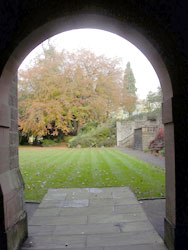 I feel profoundly blessed. God is stirring the waters around the world, and I have had the privilege to witness some of this stirring. Here I share a brief glimpse of my recent God-sighting in the U.K.
I feel profoundly blessed. God is stirring the waters around the world, and I have had the privilege to witness some of this stirring. Here I share a brief glimpse of my recent God-sighting in the U.K.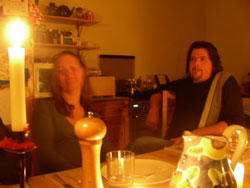 What I heard: In brief, I heard people embracing Anabaptism because they understand that to be an Anabaptist means that you are someone who sees Jesus as your example, teacher, friend, redeemer, and Lord; that Jesus is the focal point of God’s revelation; that western culture is slowly emerging from the Christendom era; that the frequent association of the church with status, wealth and force is inappropriate; that churches are called to be committed communities of discipleship and mission; that spirituality and economics are inter-connected; and that peace is at the very heart of the gospel (www.anabaptistnetwork.com/coreconvictions). I saw them building networks of like-minded people with the goal of complementing rather than competing with one another’s ministries.
What I heard: In brief, I heard people embracing Anabaptism because they understand that to be an Anabaptist means that you are someone who sees Jesus as your example, teacher, friend, redeemer, and Lord; that Jesus is the focal point of God’s revelation; that western culture is slowly emerging from the Christendom era; that the frequent association of the church with status, wealth and force is inappropriate; that churches are called to be committed communities of discipleship and mission; that spirituality and economics are inter-connected; and that peace is at the very heart of the gospel (www.anabaptistnetwork.com/coreconvictions). I saw them building networks of like-minded people with the goal of complementing rather than competing with one another’s ministries.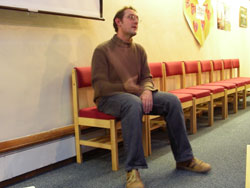 I think there’s much we can learn from our sisters and brothers in the U.K. as we enter a new era in the U.S., and I’m delighted to learn that they would like to keep the conversation going too.
I think there’s much we can learn from our sisters and brothers in the U.K. as we enter a new era in the U.S., and I’m delighted to learn that they would like to keep the conversation going too.